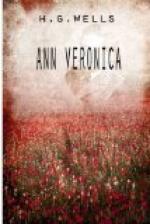“Well, I have said what I had to say, stumblingly and badly, and baldly. But I am sick of tearing up letters and hopeless of getting what I have to say better said. It would be easy enough for me to write an eloquent letter about something else. Only I do not care to write about anything else. Let me put the main question to you now that I could not put the other afternoon. Will you marry me, Ann Veronica?
“Very sincerely yours,
“Hubert Manning.”
Ann Veronica read this letter through with grave, attentive eyes.
Her interest grew as she read, a certain distaste disappeared. Twice she smiled, but not unkindly. Then she went back and mixed up the sheets in a search for particular passages. Finally she fell into reflection.
“Odd!” she said. “I suppose I shall have to write an answer. It’s so different from what one has been led to expect.”
She became aware of her aunt, through the panes of the greenhouse, advancing with an air of serene unconsciousness from among the raspberry canes.
“No you don’t!” said Ann Veronica, and walked out at a brisk and business-like pace toward the house.
“I’m going for a long tramp, auntie,” she said.
“Alone, dear?”
“Yes, aunt. I’ve got a lot of things to think about.”
Miss Stanley reflected as Ann Veronica went toward the house. She thought her niece very hard and very self-possessed and self-confident. She ought to be softened and tender and confidential at this phase of her life. She seemed to have no idea whatever of the emotional states that were becoming to her age and position. Miss Stanley walked round the garden thinking, and presently house and garden reverberated to Ann Veronica’s slamming of the front door.
“I wonder!” said Miss Stanley.
For a long time she surveyed a row of towering holly-hocks, as though they offered an explanation. Then she went in and up-stairs, hesitated on the landing, and finally, a little breathless and with an air of great dignity, opened the door and walked into Ann Veronica’s room. It was a neat, efficient-looking room, with a writing-table placed with a business-like regard to the window, and a bookcase surmounted by a pig’s skull, a dissected frog in a sealed bottle, and a pile of shiny, black-covered note-books. In the corner of the room were two hockey-sticks and a tennis-racket, and upon the walls Ann Veronica, by means of autotypes, had indicated her proclivities in art. But Miss Stanley took no notice of these things. She walked straight across to the wardrobe and opened it. There, hanging among Ann Veronica’s more normal clothing, was a skimpy dress of red canvas, trimmed with cheap and tawdry braid, and short—it could hardly reach below the knee. On the same peg and evidently belonging to it was a black velvet Zouave jacket. And then! a garment that was conceivably a secondary skirt.




